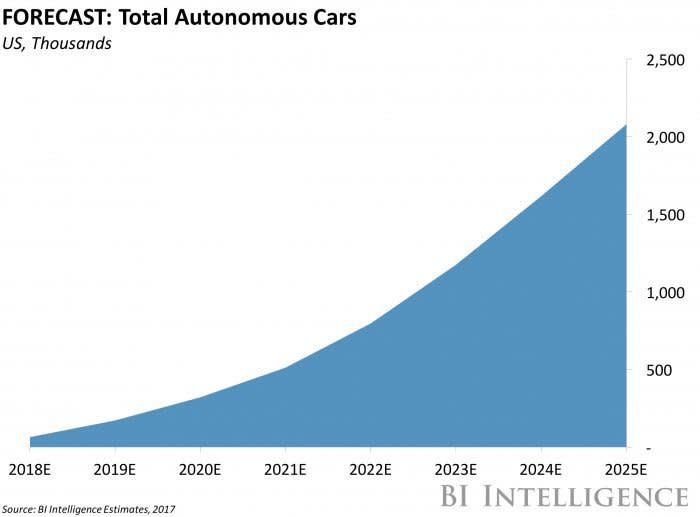Autonomous cars and the case against net neutrality

BI Intelligence
This story was delivered to BI Intelligence IoT Briefing subscribers. To learn more and subscribe, please click here.
Comcast submitted its comments to the Federal Communication Commission (FCC) on proposed changes to net neutrality rules, reports the Verge.
As part of its argument against governmental regulation of internet service providers (ISPs), Comcast pointed to autonomous cars and their data demands as a possible justification for internet “fast lanes” where some data gets transmission priority.
Autonomous cars certainly are going to generate massive quantities of data. Self-driving vehicles will generate about 40 terabytes of data every eight hours they’re on the road, according to Intel CEO Brian Krzanich. These types of vehicles feature numerous sensors that record a variety of types of data, and this data needs to be relayed back to the automaker so it can be used to monitor and improve the self-driving system. Comcast writes that autonomous cars could need “instantaneous data transmissions” to ensure safe operation, which ISPs would be able to provide by prioritizing that data traffic — running afoul of net neutrality.
But it’s unclear if autonomous cars actually need those sorts of fast lanes for safety purposes.
Much of the data cars create is processed in-vehicle. Fully driverless vehicles will need to be able to safely drive based just on the computing and sensor hardware within the car. Otherwise, an autonomous car would not be able to drive safely through remote stretches of highway where data signals can disappear. The data the vehicle does create that is shared with the manufacturer is often saved locally and transmitted when connections allow.
If self-driving cars do need fast connections for safety’s sake, charging to prioritize that data could create a challenging regulatory environment. If Comcast’s assertion is correct, then this sort of “fast lane” would be a requirement for an autonomous car and create a difficult environment for automakers to navigate, where they would need to negotiate long-term agreements with ISPs, and where any lapse in those agreements would take driverless cars off the road — a very imbalanced negotiating position.
As autonomous cars start take to the roads in growing numbers — BI Intelligence estimates that over 2 million fully autonomous cars will be on the road in 2025 — they could start to utilize massive amounts of data both uploading driving data and downloading media. Users will be free from the responsibility of driving and able to stream video content, which absent net neutrality ISPs could transmit at different speeds based on the content provider. While it’s not entirely clear if net neutrality will impact autonomous cars’ safety, it will definitely play a role in the automotive ecosystem moving forward.
BI Intelligence, Business Insider's premium research service, has compiled a detailed report on self-driving cars that:
Sizes the current and future self-driving car market, forecasting shipments and projecting installed base.
Explains the current state of technology, regulation, and consumer perception.
Analyzes how the development of autonomous cars will impact employment and the economy.
To get the full report, subscribe to an All-Access pass to BI Intelligence and gain immediate access to this report and more than 250 other expertly researched reports. As an added bonus, you'll also gain access to all future reports and daily newsletters to ensure you stay ahead of the curve and benefit personally and professionally. >> Learn More Now
You can also purchase and download the full report from our research store.
See Also:

 Yahoo News
Yahoo News 

